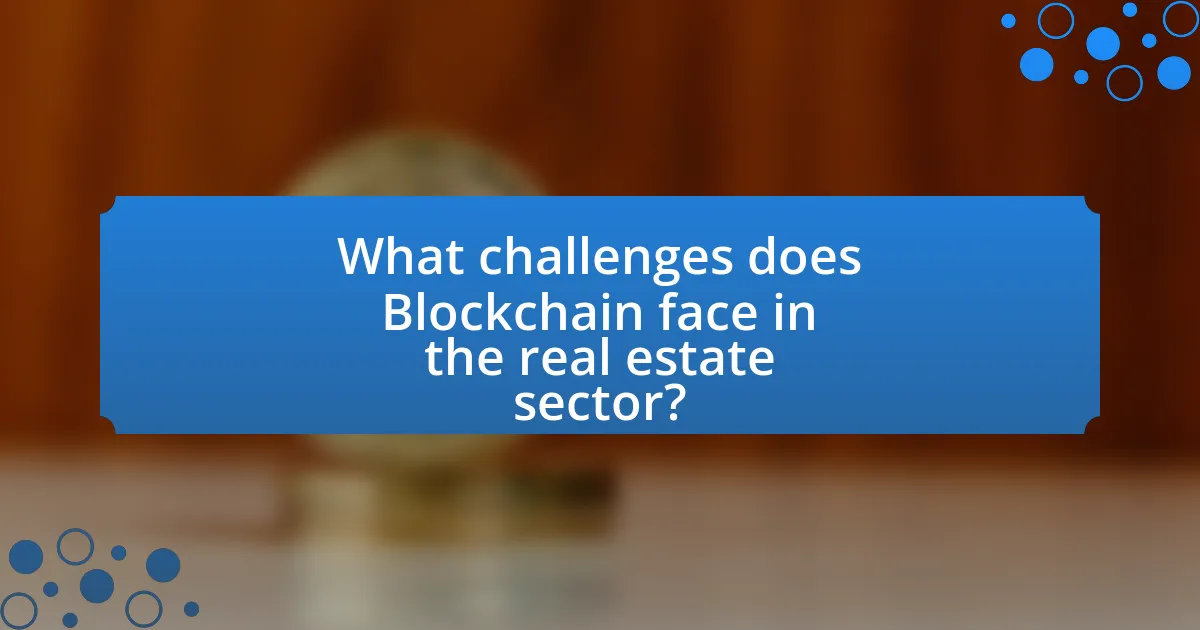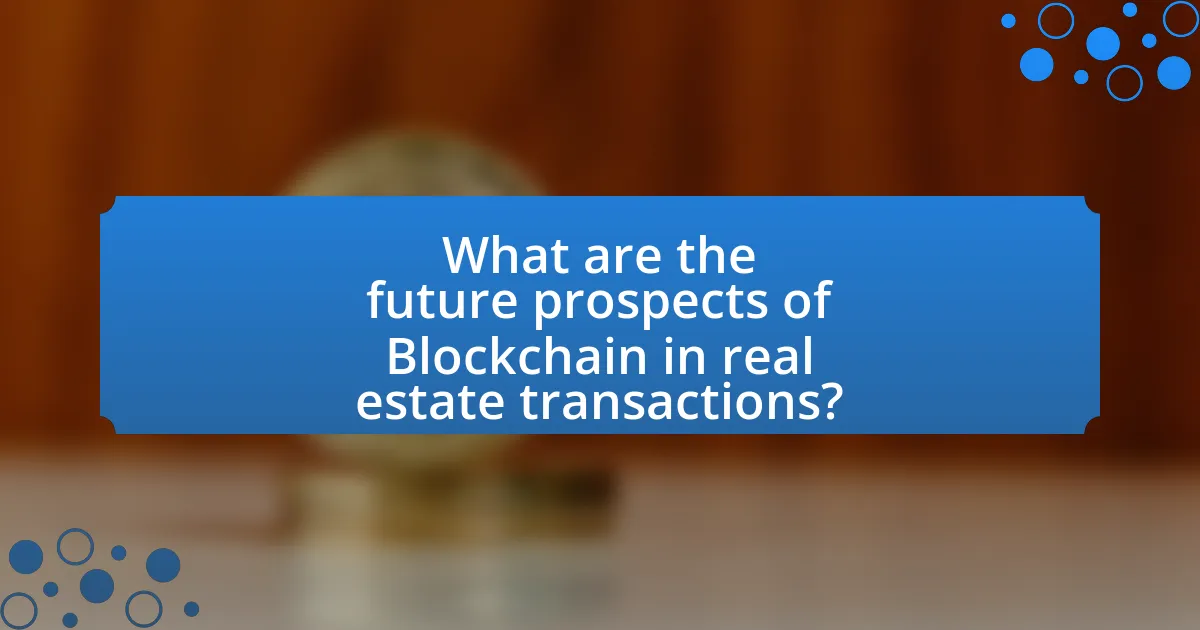Blockchain is a decentralized digital ledger technology that significantly impacts real estate transactions by enhancing transparency, security, and efficiency. This article explores how blockchain functions within the real estate sector, detailing its key components, advantages, and the ways it reduces fraud and transaction costs. It also addresses the challenges of regulatory compliance, technological barriers, and varying laws across regions that affect blockchain adoption. Furthermore, the article discusses future prospects, innovations, and best practices for implementing blockchain in real estate, emphasizing the importance of stakeholder collaboration and education for successful integration.

What is Blockchain and How is it Relevant to Real Estate Transactions?
Blockchain is a decentralized digital ledger technology that securely records transactions across multiple computers, ensuring that the recorded data cannot be altered retroactively. In real estate transactions, blockchain enhances transparency, reduces fraud, and streamlines processes by allowing for smart contracts, which automate and enforce agreements without the need for intermediaries. For instance, a study by the World Economic Forum indicates that blockchain could reduce transaction costs by up to 30% in real estate, demonstrating its potential to revolutionize the industry by making transactions faster and more efficient.
How does Blockchain technology function in the context of real estate?
Blockchain technology functions in real estate by providing a decentralized and transparent ledger for property transactions. This technology enables secure recording of ownership, title transfers, and transaction histories, reducing the risk of fraud and errors. For instance, smart contracts on blockchain automate and enforce agreements, streamlining processes such as escrow and closing. According to a report by Deloitte, blockchain can reduce transaction costs by up to 30% and significantly shorten the time required for property transactions, enhancing efficiency in the real estate market.
What are the key components of Blockchain technology?
The key components of Blockchain technology are decentralization, transparency, immutability, consensus mechanisms, and smart contracts. Decentralization allows data to be distributed across a network of computers, reducing the risk of a single point of failure. Transparency ensures that all transactions are visible to participants, fostering trust. Immutability means that once data is recorded on the blockchain, it cannot be altered, which enhances security. Consensus mechanisms, such as Proof of Work or Proof of Stake, validate transactions and maintain the integrity of the blockchain. Smart contracts are self-executing contracts with the terms directly written into code, automating processes and reducing the need for intermediaries. These components collectively enable secure and efficient transactions, making blockchain a transformative technology in various sectors, including real estate.
How does Blockchain ensure security and transparency in transactions?
Blockchain ensures security and transparency in transactions through its decentralized and immutable ledger system. Each transaction is recorded in a block that is linked to previous blocks, creating a chain that is resistant to tampering. This structure allows all participants in the network to access the same information, ensuring that any changes are visible to all parties involved. Additionally, cryptographic techniques secure the data, making it nearly impossible for unauthorized users to alter transaction records. According to a study by the World Economic Forum, blockchain technology can reduce fraud in real estate transactions by providing a clear and verifiable history of ownership and transfers, thereby enhancing trust among stakeholders.
What are the advantages of using Blockchain in real estate transactions?
The advantages of using Blockchain in real estate transactions include enhanced transparency, increased security, and reduced costs. Blockchain technology allows all parties involved in a transaction to access a single, immutable ledger, which ensures that property records are transparent and verifiable. This transparency reduces the risk of fraud and disputes, as all transactions are recorded in real-time and can be audited easily. Additionally, the decentralized nature of Blockchain enhances security by eliminating the need for intermediaries, which minimizes the chances of data tampering or unauthorized access. Furthermore, Blockchain can streamline processes such as title transfers and escrow services, leading to lower transaction costs and faster closing times. According to a report by Deloitte, implementing Blockchain in real estate could save the industry up to $1.7 trillion annually by reducing inefficiencies and transaction costs.
How does Blockchain reduce fraud in real estate deals?
Blockchain reduces fraud in real estate deals by providing a secure, transparent, and immutable ledger for property transactions. This technology ensures that all transaction records are encrypted and time-stamped, making it nearly impossible to alter or forge documents without detection. For instance, a study by the National Association of Realtors found that blockchain can significantly decrease the risk of title fraud by allowing all parties to verify ownership history and transaction details in real-time. Additionally, smart contracts automate and enforce agreements, reducing the potential for human error or manipulation, further enhancing trust in the transaction process.
What cost savings can be achieved through Blockchain implementation?
Blockchain implementation can achieve significant cost savings in real estate transactions by reducing transaction fees, minimizing fraud, and streamlining processes. For instance, traditional real estate transactions often involve multiple intermediaries, such as brokers, lawyers, and banks, each charging fees that can total 5-10% of the transaction value. Blockchain technology enables peer-to-peer transactions, eliminating the need for many intermediaries and thereby reducing these costs. Additionally, the transparency and immutability of blockchain reduce the risk of fraud, which can lead to costly legal disputes. A study by Deloitte found that blockchain could save the real estate industry up to $1.7 trillion annually by increasing efficiency and reducing transaction costs.

What challenges does Blockchain face in the real estate sector?
Blockchain faces several challenges in the real estate sector, including regulatory uncertainty, integration with existing systems, and scalability issues. Regulatory uncertainty arises because many jurisdictions lack clear guidelines on how blockchain technology should be applied to property transactions, which can hinder adoption. Integration challenges occur as real estate transactions often involve multiple stakeholders and legacy systems that may not easily interface with blockchain solutions. Scalability issues are significant as current blockchain networks may struggle to handle the high volume of transactions typical in real estate markets, potentially leading to delays and increased costs. These challenges collectively impede the widespread implementation of blockchain in real estate transactions.
What regulatory hurdles must be overcome for Blockchain adoption?
Regulatory hurdles that must be overcome for blockchain adoption include compliance with existing financial regulations, data privacy laws, and anti-money laundering (AML) requirements. Financial regulators often require blockchain solutions to align with securities laws, which can complicate the issuance of tokens representing real estate assets. Additionally, data privacy laws, such as the General Data Protection Regulation (GDPR) in Europe, impose restrictions on how personal data can be stored and processed on a blockchain. Furthermore, AML regulations necessitate robust identity verification processes, which can be challenging to implement in a decentralized environment. These regulatory challenges can hinder the widespread adoption of blockchain technology in real estate transactions.
How do varying laws across regions impact Blockchain use in real estate?
Varying laws across regions significantly impact blockchain use in real estate by creating diverse regulatory environments that can either facilitate or hinder its adoption. For instance, jurisdictions with clear legal frameworks for blockchain technology, such as Switzerland, encourage innovation and investment in real estate transactions, while regions with ambiguous or restrictive regulations, like certain states in the U.S., may deter stakeholders from utilizing blockchain for property transfers. This disparity is evident in how different countries approach smart contracts; in some places, they are legally recognized, enhancing their utility in real estate, whereas in others, the lack of legal recognition limits their effectiveness. Consequently, the regulatory landscape directly influences the speed and extent of blockchain integration in real estate markets globally.
What are the technological barriers to widespread Blockchain adoption?
The technological barriers to widespread Blockchain adoption include scalability issues, interoperability challenges, and high energy consumption. Scalability is a significant concern as many Blockchain networks struggle to process a high volume of transactions quickly; for instance, Bitcoin can handle only about seven transactions per second, compared to Visa’s capacity of thousands. Interoperability challenges arise because different Blockchain platforms often cannot communicate with each other, hindering seamless integration across systems. Additionally, the high energy consumption associated with proof-of-work consensus mechanisms raises environmental concerns, as seen in Bitcoin mining, which consumes more energy than some countries. These barriers collectively impede the broader implementation of Blockchain technology in various sectors, including real estate transactions.
How can stakeholders address the challenges of Blockchain in real estate?
Stakeholders can address the challenges of Blockchain in real estate by implementing regulatory frameworks, enhancing interoperability, and investing in education and training. Regulatory frameworks can provide clarity and security, as seen in jurisdictions like Switzerland, where clear guidelines have fostered Blockchain adoption in real estate transactions. Enhancing interoperability between different Blockchain systems can facilitate smoother transactions, as demonstrated by initiatives like the Real Estate Standards Organization (RESO) which aims to create common standards. Additionally, investing in education and training for real estate professionals can mitigate knowledge gaps, as evidenced by programs offered by institutions like the Urban Land Institute, which focus on Blockchain’s applications in real estate.
What role do industry partnerships play in overcoming obstacles?
Industry partnerships play a crucial role in overcoming obstacles in the adoption of blockchain technology in real estate transactions. These collaborations facilitate knowledge sharing, resource pooling, and the development of standardized practices, which are essential for addressing regulatory, technical, and market challenges. For instance, partnerships between technology firms and real estate companies can lead to the creation of tailored blockchain solutions that enhance transparency and security, thereby increasing stakeholder trust. Additionally, joint efforts can help navigate complex legal frameworks, as seen in initiatives like the Real Estate Blockchain Alliance, which aims to establish best practices and promote the integration of blockchain in real estate.
How can education and awareness improve Blockchain adoption?
Education and awareness can significantly improve Blockchain adoption by equipping individuals and organizations with the knowledge necessary to understand its benefits and applications. When stakeholders in real estate transactions are educated about Blockchain’s capabilities, such as enhanced security, transparency, and efficiency, they are more likely to embrace the technology. For instance, a survey by Deloitte found that 39% of real estate executives believe that Blockchain will have a significant impact on their industry, indicating a growing recognition of its potential. Furthermore, awareness campaigns can demystify Blockchain, addressing misconceptions and highlighting successful case studies, which can foster trust and encourage adoption among hesitant users.

What are the future prospects of Blockchain in real estate transactions?
The future prospects of blockchain in real estate transactions are highly promising, as it offers enhanced transparency, security, and efficiency. Blockchain technology can streamline the process of property transfers by providing a decentralized ledger that records all transactions, reducing the risk of fraud and errors. According to a report by Deloitte, blockchain can decrease transaction times by up to 50% and significantly lower costs associated with property transactions. Furthermore, smart contracts on blockchain platforms can automate various processes, such as escrow and title transfers, ensuring that conditions are met before transactions are finalized. This technological advancement is expected to revolutionize the real estate industry by making transactions more accessible and reliable for all parties involved.
How might Blockchain technology evolve in the real estate market?
Blockchain technology is likely to evolve in the real estate market by enhancing transparency, streamlining transactions, and reducing fraud. As blockchain provides a decentralized ledger, it allows for secure and immutable records of property ownership and transaction history, which can significantly reduce the risk of disputes and fraud. According to a report by Deloitte, the integration of blockchain in real estate could lead to a 30% reduction in transaction costs by automating processes such as title searches and escrow services. Furthermore, smart contracts on blockchain can facilitate automatic execution of agreements when conditions are met, thereby expediting the closing process. This evolution is supported by increasing interest from real estate firms and regulatory bodies exploring blockchain applications to improve efficiency and trust in property transactions.
What innovations could emerge from Blockchain integration in real estate?
Blockchain integration in real estate could lead to innovations such as enhanced transparency, streamlined transactions, and improved security. By utilizing smart contracts, property transactions can be automated, reducing the need for intermediaries and minimizing the risk of fraud. A study by the World Economic Forum indicates that blockchain could reduce transaction costs by up to 30% in real estate markets. Additionally, tokenization of real estate assets allows for fractional ownership, making investments more accessible to a broader range of investors. This innovation can democratize real estate investment, enabling smaller investors to participate in high-value properties.
How can Blockchain reshape the buyer-seller relationship in real estate?
Blockchain can reshape the buyer-seller relationship in real estate by enhancing transparency, security, and efficiency in transactions. By utilizing smart contracts, buyers and sellers can automate agreements, reducing the need for intermediaries and minimizing the risk of fraud. For instance, a study by the National Association of Realtors indicates that blockchain technology can streamline the closing process, which traditionally takes weeks, to mere hours. This increased efficiency fosters trust between parties, as all transaction details are securely recorded on an immutable ledger, allowing for real-time verification of ownership and property history.
What best practices should be followed when implementing Blockchain in real estate?
When implementing Blockchain in real estate, best practices include ensuring regulatory compliance, selecting the right technology, and fostering stakeholder collaboration. Regulatory compliance is crucial as it aligns Blockchain applications with existing laws, such as property rights and anti-money laundering regulations, which vary by jurisdiction. Selecting the right technology involves choosing a Blockchain platform that supports smart contracts and offers scalability, security, and interoperability, as evidenced by the increasing adoption of Ethereum and Hyperledger in real estate projects. Fostering stakeholder collaboration is essential to build trust and facilitate the integration of Blockchain solutions among various parties, including buyers, sellers, agents, and financial institutions, which can enhance transaction efficiency and transparency.
How can real estate professionals prepare for Blockchain integration?
Real estate professionals can prepare for Blockchain integration by educating themselves on Blockchain technology and its applications in real estate transactions. Understanding how Blockchain can enhance transparency, security, and efficiency in property transactions is crucial. For instance, a study by Deloitte highlights that Blockchain can reduce transaction costs by up to 30% and streamline processes such as title transfers and escrow services. Additionally, professionals should engage with technology providers to explore Blockchain solutions tailored for real estate, participate in industry workshops, and collaborate with legal experts to navigate regulatory implications. This proactive approach will enable real estate professionals to leverage Blockchain effectively, ensuring they remain competitive in a rapidly evolving market.
What common pitfalls should be avoided during Blockchain adoption?
Common pitfalls to avoid during Blockchain adoption include inadequate understanding of the technology, lack of regulatory compliance, and insufficient stakeholder engagement. Inadequate understanding can lead to misaligned expectations and ineffective implementation, as many organizations underestimate the complexity of Blockchain systems. Lack of regulatory compliance can result in legal challenges, as Blockchain operates in a rapidly evolving regulatory landscape that varies by jurisdiction. Insufficient stakeholder engagement can hinder the adoption process, as successful Blockchain initiatives require collaboration among various parties, including developers, users, and regulators. These pitfalls can significantly impact the effectiveness and sustainability of Blockchain solutions in real estate transactions.

